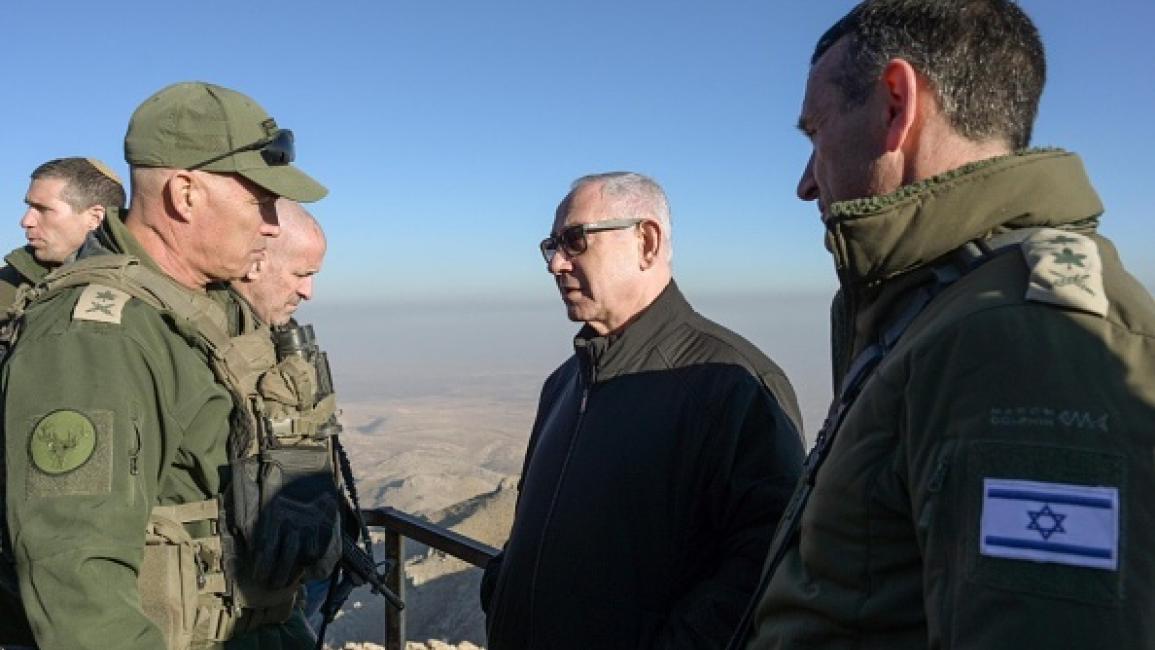The Israeli occupation has initiated logistical preparations to bolster its control over the Syrian side of Mount Hermon and adapt to the harsh winter conditions in the region. These efforts are accompanied by renewed Israeli warnings to the leader of the new Syrian administration regarding the potential arrival of what it describes as “jihadists” in southern Syria.
According to Yediot Aharonot, the Israeli army has launched a “complex” logistical operation, constructing military headquarters and infrastructure at the summit of Mount Hermon, including newly occupied territories. This operation aims to complete preparations for the severe winter, characterized by heavy snowfall on the mountain.
The report highlighted that the army’s technology and logistics division has built specialized roads to the Syrian summit, facilitating daily convoys of tactical trucks carrying tons of construction materials and equipment. These efforts are designed to ensure Israeli control over the summit at least until the current winter ends.
The Israeli army is establishing two key military positions on Syrian territory. The first, located at an altitude of 2,400 meters, consists of reinforced mobile buildings designed to house soldiers even under snowfall reaching six meters in height.
Thawing Technology
At 2,800 meters, atop the newly occupied section, an additional base is being constructed, modelled after the main Syrian outpost abandoned by Assad regime forces roughly two weeks ago. The army’s logistics teams are refurbishing the site to accommodate soldiers tasked with maintaining the area, which is considered “enemy territory.” Preparations include cleaning, painting, repairs, installation of communication and military equipment, furnishing living quarters, provisioning containerized food storage, and setting up a massive water tank capable of holding 20,000 litres.
Sharaa and the U.S. Delegation: Balancing Interests and Priorities
Furthermore, the Israeli army is installing various thawing technologies to ensure the operation of military tools and equipment in sub-zero temperatures without freezing. It also plans to deploy a specialized snow-melting machine to convert snow into potable water for soldiers, drawing on the experiences of foreign armies in similar conditions. As an additional precaution, hypothermia treatment rooms are being set up to provide rapid and effective care without the need to evacuate affected soldiers.
On Monday, Yediot Aharonot reported that Tel Aviv issued a warning to the Syrian leadership to prevent the arrival of “jihadists” in southern Syria. The newspaper did not specify how the warning was delivered or the exact party responsible—whether military or political—but claimed that if the Syrian side demonstrates “responsibility,” Israel may “consider” transferring control of the buffer zone. Otherwise, it emphasized, Israel would “continue safeguarding its security.” Notably, the buffer zone remains sovereign Syrian territory, and Israel did not clarify the precise responsibilities it expects from the new Syrian government.
“Keeping a close watch”
Following this warning, and despite Syrian leader Farouk Al-Sharaa’s call for the international community to compel Israel to adhere to the Disengagement Agreement after the fall of the Assad regime, Israel reiterated in a subsequent message that its army had seized control of the buffer zone based on security considerations. It cited fears of a recurrence of events like “Operation Al-Aqsa Flood” on October 7, 2023, asserting that it “will not allow such a scenario to happen again.”
The Israeli Security and Political Affairs Cabinet (Kabinet), convening in the Northern Command yesterday, discussed the evolving situations in Syria and Lebanon. Ministers received briefings suggesting that Syrian “rebels,” as described by Israel, are presenting the international community with a vision of neutralizing Syria from regional conflicts. However, this does not preclude Israel from “keeping a close watch” on developments under the new regime.
Since the fall of the Assad regime, Israel has exploited Syria’s internal preoccupations to shape its future. It regarded the regime’s rapid collapse as a result of Israeli strikes against Hezbollah and Iran, compounded by Russia’s engagement in the Ukraine war. These factors weakened Assad’s allies and expedited the opposition’s swift advances, enabling them to seize control of key state institutions. Israeli Prime Minister Benjamin Netanyahu underscored this interpretation in multiple statements, claiming, “The blows we inflicted on Hezbollah and Iran contributed to the fall of the Assad regime.”
This article was translated and edited by The Syrian Observer. The Syrian Observer has not verified the content of this story. Responsibility for the information and views set out in this article lies entirely with the author.


